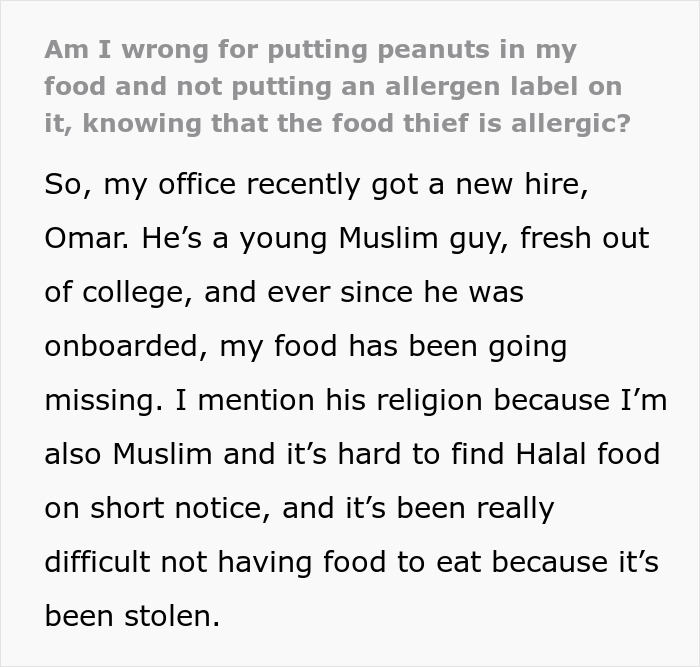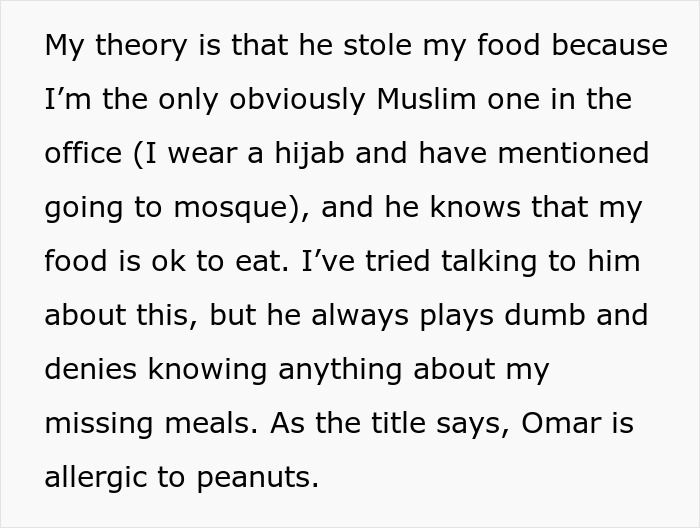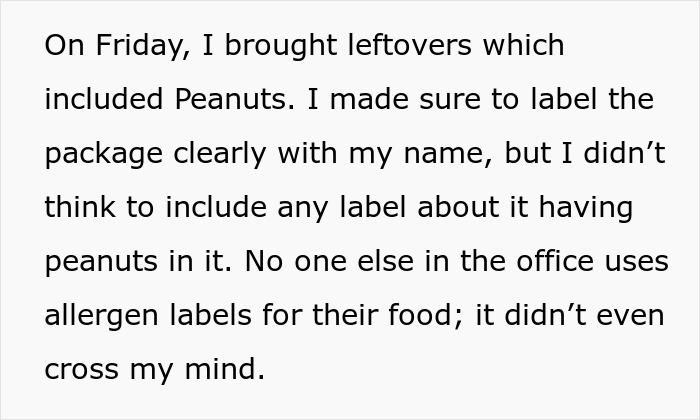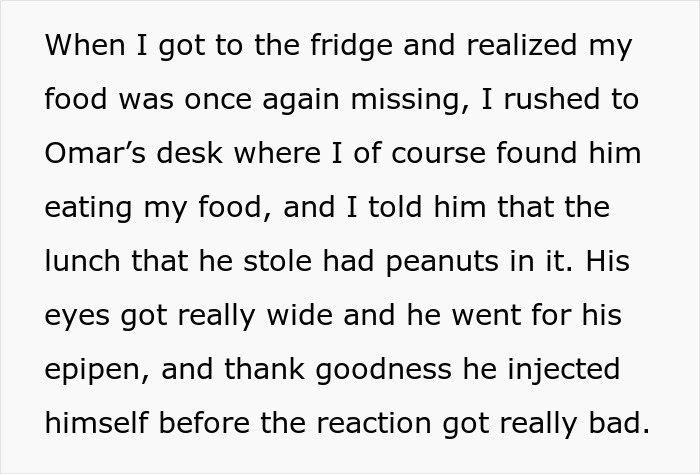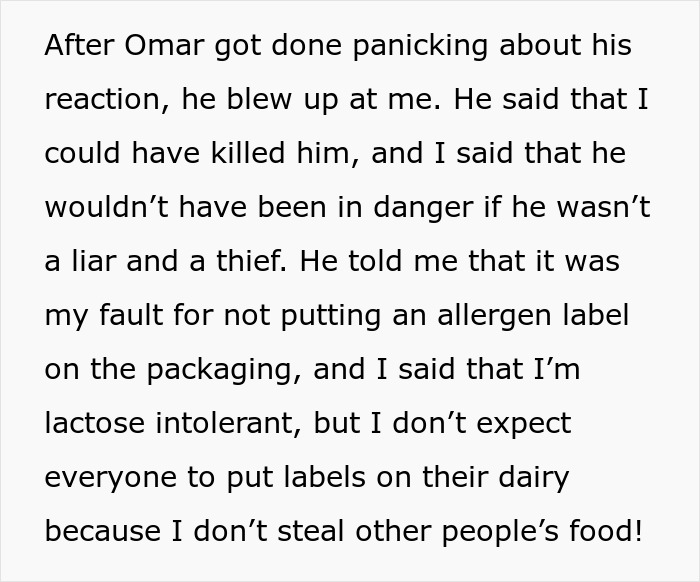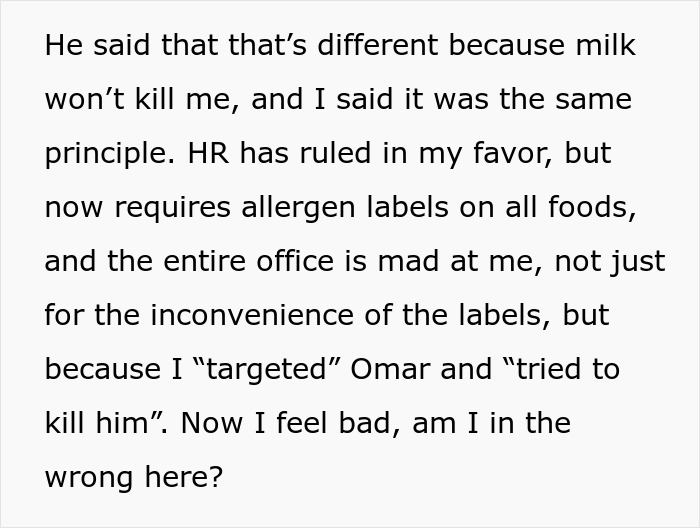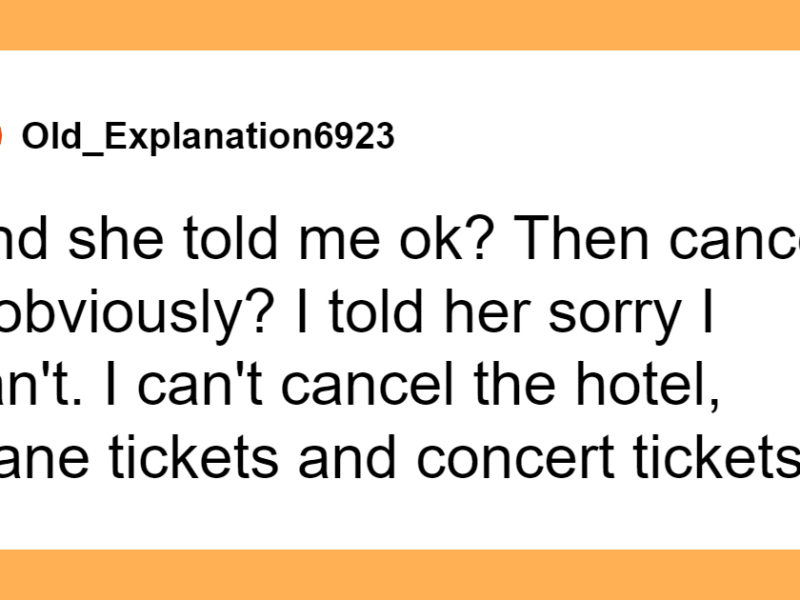[ad_1]
Even if you love your job, there’s a good chance that your lunch break is one of your favorite parts of the day. You finally get to rest your brain, socialize with colleagues, take a walk to get some fresh air and enjoy a delicious meal that you’ve prepared. Assuming no one steals your lunch before you get to eat it, that is.
One woman recently posted on Reddit detailing some drama she experienced in her office surrounding a food thief, so below, you’ll find the full story, as well as some of the replies readers left her.
This woman knew that a colleague kept taking her lunches from the fridge
Image credits: Prostock-studio / envato (not the actual photo)
But nothing was done until he accidentally ate a meal that he was allergic to
Image credits: DragonImages / envato (not the actual photo)
Image credits: One_Newspaper5657
Food theft is a common problem in many workplaces
In any workplace, there are a few unspoken rules that HR probably doesn’t feel the need to tell all new hires, but most employees understand. Keep your voice down in the office while others are trying to work, and don’t stick your nose in anyone else’s business. Be kind to your colleagues even if they annoy you, and show up on time every day. And of course, don’t touch anyone else’s food in the fridge.
But perhaps HR does need to be reminding every employee to keep their hands to themselves in the kitchen, because according to Zippia, one third of workers actually admit to stealing food from colleagues. And a whopping 47% of workers say they’ve been victims of food theft at work.
When it comes to what lunch thieves choose to steal, Zippia reports that drinks are commonly swiped. Red Bull, juices, sodas and special coffees seem to disappear faster than any other drinks. Food on counters and in candy bowls are often seen as fair game too. And if you bring pizza into the office, you might want to be discreet about it, as 16% of workers believe that they don’t need permission if they want to steal a slice from a colleague.
One in ten adults has a food allergy
Image credits: Care_SMC / pexels (not the actual photo)
While it’s always rude to swipe a coworker’s lunch, it’s especially bold (and dangerous) to do so if you have an allergy. According to Food Allergy Research & Education, one in ten adults in the United States has a food allergy. Peanut allergies in particular are the second most common food allergy in the US, and they’re often among the most serious.
Exposure to peanuts for someone with an allergy can be life threatening. It can cause skin reactions such as hives or swelling, itching or tingling in and around the mouth and throat, digestive problems, tightening of the throat, shortness of breath or wheezing, runny nose and anaphylaxis. Some people can even have symptoms from cross-contact or inhalation, without even having direct skin contact with peanuts or eating them.
To avoid coming into contact with peanuts, the American College of Allergy, Asthma & Immunology recommends those with allergies be very careful about what they eat. Dining out or eating food at potlucks or prepared by strangers can pose a huge risk. Even bakeries and ice cream parlors that have peanuts present in some products might be dangerous, due to cross-contamination.
Companies and workers can take action to prevent food theft in offices
Image credits: drazenphoto / envato (not the actual photo)
Preventing food theft in the workplace is probably the last thing that HR wants to worry about, but we all know how important employee satisfaction is. And if you don’t even feel confident that your lunch will still be in the fridge waiting for you when it’s time to eat, you probably won’t feel very comfortable in your office. Essential HR recommends that companies provide workers with reminders to only eat what they bring in.
A sign on the fridge reminding everyone to label their food and keep their hands to themselves might discourage thieves. Emails alerting everyone about food theft might be helpful as well, as it might encourage workers to keep a closer eye on one another. And it can be wise to place the lunchroom in an area that’s visible to all, so nobody can sneak in unnoticed and eat another person’s lunch without getting caught.
But if your company isn’t doing enough to prevent theft, Essential HR suggests that employees bring “de-constructed” lunches, because thieves probably don’t want to put effort into assembling their meals. You might also try clearly labeling your food and using opaque bags or Tupperware containers, rather than leaving food in packaging that makes it clear what’s inside. And if all else fails, get a lock for your lunchbox.
Readers assured the woman that she did nothing wrong and called out her colleagues for blaming her for the theft
[ad_2]
Source link


